In Focus This Week
Making vote-by-mail work
How election offices are modernizing their back offices
By: Steve Lund, technical product manager
U.S. Digital Response
Election officials managing vote-by-mail operations are stretched thin. Higher volumes, tighter timelines, increased public scrutiny, and most jurisdictions are managing it all with paper-based systems built for a different era. Yet modernizing these critical operations  doesn’t require overhauling entire infrastructure. Across the country, election offices are utilizing strategic, data-driven improvements to their vote-by-mail workflows that can meaningfully improve voter access, strengthen security, and reduce staff burden.
doesn’t require overhauling entire infrastructure. Across the country, election offices are utilizing strategic, data-driven improvements to their vote-by-mail workflows that can meaningfully improve voter access, strengthen security, and reduce staff burden.
U.S. Digital Response (USDR), a nonpartisan nonprofit focused on modernizing government digital services, has worked with election offices in Washington, Oregon, and beyond to identify and implement these kinds of improvements. The work demonstrates what’s possible when election officials partner with technical experts who understand both the technology landscape and the unique constraints of running elections.
Reaching voters where they are: The drop box optimization approach
One of the most straightforward, yet often overlooked, opportunities to improve vote-by-mail access is drop box placement. In 2022, Paddy McGuire, the county auditor in Mason County, Washington, wanted to better understand reports from voters about traveling long distances to reach a ballot drop box. He wanted to tackle a simple question: How many voters were actually within a reasonable distance of their nearest drop box, and where could strategic placement changes have the greatest impact?
Election officials can use spatial analysis to benchmark current access levels and equity as measured by travel time to the nearest drop box, then identify placements that maximize coverage within existing constraints. Snohomish County, Washington and USDR worked together to make strategic changes around drop box placement, putting 89% of voters within a 10-minute drive of their nearest drop box, improving access for tens of thousands of voters.
This same analytical approach can be applied to early voting locations as well. The benefits extend beyond voter convenience. Better-placed drop boxes and voting sites also provide election officials with data to support budget requests and policy decisions, moving conversations from anecdotal evidence to evidence-based planning.
From paper to digital: Modernizing chain of custody
If drop box placement is about reaching voters, chain of custody documentation is about maintaining security and transparency once ballots arrive. Traditional paper forms present familiar challenges: they’re difficult to search and track, they cover only the bare minimum, and they create another layer of printing, filing, and storage.
Shifting from paper to digital chain of custody systems allows election offices to document security concerns with notes and photos, gain instant visibility into retrieval operations, and ultimately run more secure and transparent elections. One example is a mobile-friendly template USDR built in Airtable, now available as a free resource through the U.S. Alliance for Election Excellence.
“The developers I was working with asked great questions that expanded my thoughts about possibilities. It gave me an appreciation of how broad a tool of this nature could be used,” Lori Larsen, Stevens County Auditor, said.
 These digital tools can start simple and scale to handle multiple totes or seals per visit, capture additional statuses and actions, schedule retrieval teams, or adapt to other specific workflows. The key is that the system is designed around how election offices actually work, not around what software vendors think they should be doing.
These digital tools can start simple and scale to handle multiple totes or seals per visit, capture additional statuses and actions, schedule retrieval teams, or adapt to other specific workflows. The key is that the system is designed around how election offices actually work, not around what software vendors think they should be doing.
Tracking the full journey: Absentee ballot application management
The absentee ballot application process represents another opportunity for modernization. From initial paper application through approval and delivery, this workflow is often fragmented across systems, creating errors, inefficiencies, and unnecessary staff burden.
One large southeastern county tracked absentee ballot requests through every step of the process after the initial paper application. By moving applications through simple digital forms and creating dashboards to examine trends, they were able to reduce errors, decrease staff burden, and maintain throughput despite higher volume. The improvement even extended to voter-facing service: read-only access for call center staff meant constituents could get quick status updates while on the phone, replacing the frustration of “I don’t know” with immediate transparency.
“Working with USDR has allowed us to create innovative tools that fit our specific needs. This has helped decrease the burden on staff and increase time savings in multiple departments,” one election official involved in similar work noted
Why these changes matter now
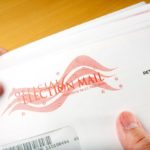 Election offices nationwide are under pressure to do more with the same resources. Voter expectations around transparency and accessibility continue to rise, while staff turnover and budget constraints persist. These solutions eliminate unnecessary friction in existing processes.
Election offices nationwide are under pressure to do more with the same resources. Voter expectations around transparency and accessibility continue to rise, while staff turnover and budget constraints persist. These solutions eliminate unnecessary friction in existing processes.
The good news: these modernizations don’t require starting from scratch. Election offices across the country are proving that simple strategic improvements to vote-by-mail operations can make a meaningful difference in both voter access and staff capacity. And they’re happening now, in jurisdictions of all sizes.
For election officials considering where to start, the path forward is clear: identify the highest-friction points in your vote-by-mail workflow, gather data to understand impact, and prioritize improvements that deliver the most value to voters and staff alike.
Start optimizing before your next election cycle
UDSR deploys expert, nonpartisan help within days, offers pro-bono or affordable options, and builds sustainable internal capacity so your team can maintain improvements. Contact us to schedule a 30-minute call to identify the highest-impact vote-by-mail optimizations before your next cycle and start scoping a solution.
Available RFPs
MEDSL Request for Proposals
Practice-Oriented Research to Improve Voter Registration and List Maintenance
Maintaining secure, accurate, and accessible voter registration rolls is an ongoing challenge that has come under increased political  scrutiny in recent years. Recognizing that challenge, the MIT Election Data + Science Lab (MEDSL) is pleased to announce that we are seeking to award $500,000 in grants to support research projects that aim to improve the security, accuracy, and accessibility of voter registration systems and list maintenance practices.
scrutiny in recent years. Recognizing that challenge, the MIT Election Data + Science Lab (MEDSL) is pleased to announce that we are seeking to award $500,000 in grants to support research projects that aim to improve the security, accuracy, and accessibility of voter registration systems and list maintenance practices.
Through this new program, we seek to improve understanding of how the voter registration system currently operates, encourage innovation in adopting new approaches to list maintenance, and equip policymakers, administrators, and the public with reliable information about the system. We aim to inform practitioners and policymakers about current issues and close practice gaps. The program will focus on achieving immediate impact, examining practices that could be implemented quickly and illuminating current issues faced by policymakers and the public.
As part of our dedication to improving policymaking, practice, and understanding in this area, we are looking for projects that include a strong partnership component, aligning the goals of the research with the needs of election practitioners. More information about the program, as well as selection criteria and proposal guidelines, can be found in the full request for proposals on our website here.
While not required, we encourage those interested in applying to submit a brief letter of intent to medsl-grants@mit.edu by December 15, 2025. Proposals are due January 16, 2026. If you have any questions about the program or grant process, please contact us at medsl-grants@mit.edu.
electionline Merch Store
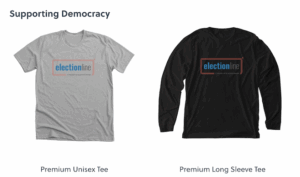 You’ve asked for it, well now you’ve got it! Just in time for all of your holiday gift-giving. We’ve opened up an electionline merch store using Bonfire. Currently we’re offering a couple of different t-shirts, a long-sleeve t-shirt and a hoodie.
You’ve asked for it, well now you’ve got it! Just in time for all of your holiday gift-giving. We’ve opened up an electionline merch store using Bonfire. Currently we’re offering a couple of different t-shirts, a long-sleeve t-shirt and a hoodie.
Upcoming Holiday Schedule
During the upcoming holiday season, electionline–both the Daily and the Weekly–will be making some temporary changes to their schedules. Here’s what we’ve got for now!
November
Electionline Daily News: The Daily News will not publish on Thursday, November 28 and Friday. November 28.
ElectionlineWeekly: The Weekly will not publish on Thursday, November 28.
December
Electionline Daily News: The Daily News will NOT publish December 24-26, December 31 or January 1, 2026. From December 22-January 2, 2026 on the days the Daily does post, it will post by 10am Eastern. Additionally, the Daily News will publish by 10am Eastern on Wednesday, December 17.
ElectionlineWeekly: The Weekly will not publish on December 25 or January 1, 2026. It will however publish on Tuesday, December 30 and feature our always much anticipated In & Out List.
Election News This Week
 Federal Update: Ten Democratic secretaries of state asked the Trump administration to provide more information about its wide-ranging efforts to seek statewide voter registration lists, citing concerns that federal agencies have apparently misled them and might be entering the data in a program used to verify U.S. citizenship. In a letter sent to Attorney General Pam Bondi and Homeland Security Secretary Kristi Noem, the secretaries of state expressed “immense concern” over reports that the Justice Department has shared voter data from states with the Department of Homeland Security. “Given the unprecedented nature and scope of the DOJ’s requests, we require additional information about how this information will be used, shared, and secured,” they wrote. In response to a request for comment, the Justice Department shared a previous statement from Harmeet Dhillon, who leads the DOJ’s Civil Rights Division. “Clean voter rolls and basic election safeguards are requisites for free, fair, and transparent elections,” she stated. “The DOJ Civil Rights Division has a statutory mandate to enforce our federal voting rights laws, and ensuring the voting public’s confidence in the integrity of our elections is a top priority of this administration.” In their letter, the 10 election officials said federal officials “shared misleading and at times contradictory information” in two recent meetings arranged by the National Association of Secretaries of State. The letter from the Democratic secretaries of state asks for the administration to answer several questions, including whether the Justice Department has shared or intends to share voter files with the Department of Homeland Security or other federal agencies and, if so, how those other agencies would use the data. “DHS told Secretaries of State that they would not use — or have use for — voter information. Does DHS continue to stand by this assertion given public reporting and statements that appear to contradict those statements?” the letter asks. Other questions focused on the confidentiality and security measures being taken to protect the data, and how federal agencies are complying with privacy laws. The letter was sent by the secretaries of state from Arizona, California, Colorado, Maine, Minnesota, Nevada, New Mexico, Oregon, Vermont and Washington. They have asked the Trump administration to provide responses by Dec. 1.
Federal Update: Ten Democratic secretaries of state asked the Trump administration to provide more information about its wide-ranging efforts to seek statewide voter registration lists, citing concerns that federal agencies have apparently misled them and might be entering the data in a program used to verify U.S. citizenship. In a letter sent to Attorney General Pam Bondi and Homeland Security Secretary Kristi Noem, the secretaries of state expressed “immense concern” over reports that the Justice Department has shared voter data from states with the Department of Homeland Security. “Given the unprecedented nature and scope of the DOJ’s requests, we require additional information about how this information will be used, shared, and secured,” they wrote. In response to a request for comment, the Justice Department shared a previous statement from Harmeet Dhillon, who leads the DOJ’s Civil Rights Division. “Clean voter rolls and basic election safeguards are requisites for free, fair, and transparent elections,” she stated. “The DOJ Civil Rights Division has a statutory mandate to enforce our federal voting rights laws, and ensuring the voting public’s confidence in the integrity of our elections is a top priority of this administration.” In their letter, the 10 election officials said federal officials “shared misleading and at times contradictory information” in two recent meetings arranged by the National Association of Secretaries of State. The letter from the Democratic secretaries of state asks for the administration to answer several questions, including whether the Justice Department has shared or intends to share voter files with the Department of Homeland Security or other federal agencies and, if so, how those other agencies would use the data. “DHS told Secretaries of State that they would not use — or have use for — voter information. Does DHS continue to stand by this assertion given public reporting and statements that appear to contradict those statements?” the letter asks. Other questions focused on the confidentiality and security measures being taken to protect the data, and how federal agencies are complying with privacy laws. The letter was sent by the secretaries of state from Arizona, California, Colorado, Maine, Minnesota, Nevada, New Mexico, Oregon, Vermont and Washington. They have asked the Trump administration to provide responses by Dec. 1.
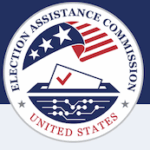 U.S. EAC Update: Democratic Sens. Ron Wyden and Jeff Merkley of Oregon and Alex Padilla and Adam Schiff of California sent a letter to U.S. Election Assistance Commissioner Christy McCormick in response to her Oct. 29 appearance at a think tank closely aligned with President Donald Trump. During the panel, McCormick said that Democrats needed “open borders, they need illegal citizens to increase their votes,” and said she considered casting ballots addressed to other people but that arrived at her California home. “This is deeply dangerous to voters, our election system, and more broadly to our democracy,” the senators wrote in their letter. “EAC commissioners carry an extra level of responsibility when speaking about election administration, and if you stand by your public statements about widespread voter fraud without any evidence, we urge you to resign immediately.” The Election Assistance Commission did not immediately respond to an inquiry from the Capital Chronicle. Oregon Secretary of State Tobias Read called for McCormick to resign within days of her comments, saying it’s “un-American to spread lies that sow fear and paranoia in the heart of our democracy.”
U.S. EAC Update: Democratic Sens. Ron Wyden and Jeff Merkley of Oregon and Alex Padilla and Adam Schiff of California sent a letter to U.S. Election Assistance Commissioner Christy McCormick in response to her Oct. 29 appearance at a think tank closely aligned with President Donald Trump. During the panel, McCormick said that Democrats needed “open borders, they need illegal citizens to increase their votes,” and said she considered casting ballots addressed to other people but that arrived at her California home. “This is deeply dangerous to voters, our election system, and more broadly to our democracy,” the senators wrote in their letter. “EAC commissioners carry an extra level of responsibility when speaking about election administration, and if you stand by your public statements about widespread voter fraud without any evidence, we urge you to resign immediately.” The Election Assistance Commission did not immediately respond to an inquiry from the Capital Chronicle. Oregon Secretary of State Tobias Read called for McCormick to resign within days of her comments, saying it’s “un-American to spread lies that sow fear and paranoia in the heart of our democracy.”
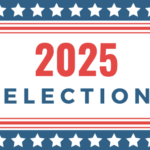 2025 Election News: Work continued this week to complete the 2025 election cycle. In Chester County, Pennsylvania, the county has appointed West Chester-based law firm Fleck Eckert Klein McGarry to independently investigate the poll book issue, which forced thousands of voters to use provisional ballots on Election Day. The county has also accepted most of the provisional ballots that were cast that day. In total, the county received about 12,600 provisional ballots — or roughly 6.4% of the total ballots cast in the county — more than in any other election in recent history. Roughly 11,200 of those ballots were counted without issue after the county confirmed the voters’ eligibility. The Rensselaer County, New York Board of Elections announced a full recount of the 2025 General Election on Wednesday due to a formatting error. According to a joint statement by the Republican and Democratic Commissioners, the error was discovered while they were re-canvassing the ballots as part of the post-election verification process. The board of elections believes the error may have led to incorrect unofficial election results. They stated that in some towns, only ballot propositions were reported on election night. Maricopa County, Arizona election officials said they were able to count a vast majority of the over 2,000 misplaced ballots that were discovered days after the Nov. 4 elections. Of the 2,288 ballots found, 30 needed to be sent to curing, according to the Maricopa County Recorder’s Office. That means election workers needed to contact the voter to verify their signature. A state investigation is underway in Elmore County, Idaho after nearly 300 legally cast ballots were never counted in this month’s election – a number large enough to alter the outcome of multiple local races. The Idaho Secretary of State’s Office confirmed the discrepancy was discovered November 14, after officials noticed that the number of ballots cast did not match the number of voters checked in at the polls. On November 18, the Elmore County sheriff began securing every ballot as the investigation moves forward. “We identified that there was a discrepancy between the number of ballots having been cast on election night versus the number of voters who showed up and voted,” Secretary of State Phil McGrane said in an interview with Idaho News 6.
2025 Election News: Work continued this week to complete the 2025 election cycle. In Chester County, Pennsylvania, the county has appointed West Chester-based law firm Fleck Eckert Klein McGarry to independently investigate the poll book issue, which forced thousands of voters to use provisional ballots on Election Day. The county has also accepted most of the provisional ballots that were cast that day. In total, the county received about 12,600 provisional ballots — or roughly 6.4% of the total ballots cast in the county — more than in any other election in recent history. Roughly 11,200 of those ballots were counted without issue after the county confirmed the voters’ eligibility. The Rensselaer County, New York Board of Elections announced a full recount of the 2025 General Election on Wednesday due to a formatting error. According to a joint statement by the Republican and Democratic Commissioners, the error was discovered while they were re-canvassing the ballots as part of the post-election verification process. The board of elections believes the error may have led to incorrect unofficial election results. They stated that in some towns, only ballot propositions were reported on election night. Maricopa County, Arizona election officials said they were able to count a vast majority of the over 2,000 misplaced ballots that were discovered days after the Nov. 4 elections. Of the 2,288 ballots found, 30 needed to be sent to curing, according to the Maricopa County Recorder’s Office. That means election workers needed to contact the voter to verify their signature. A state investigation is underway in Elmore County, Idaho after nearly 300 legally cast ballots were never counted in this month’s election – a number large enough to alter the outcome of multiple local races. The Idaho Secretary of State’s Office confirmed the discrepancy was discovered November 14, after officials noticed that the number of ballots cast did not match the number of voters checked in at the polls. On November 18, the Elmore County sheriff began securing every ballot as the investigation moves forward. “We identified that there was a discrepancy between the number of ballots having been cast on election night versus the number of voters who showed up and voted,” Secretary of State Phil McGrane said in an interview with Idaho News 6.
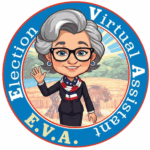 Ohio AI: Ohio Secretary of State Frank LaRose recently announced that his office has trained and deployed the state’s first AI-powered election administration assistant with immediate, around-the-clock availability to election officials in all 88 counties. The new, tech-savvy aide, who goes by the name Eva (for Elections Virtual Assistant), will serve as a cyber-advisor to boards of elections, using the latest technology to offer targeted, efficient guidance on the often complex rules and procedures of Ohio’s voting process. “She’s definitely a data nerd and a bit on the wonky side, but I’m not sure I’ve met someone who can answer a common question about election administration as quickly and effectively as Eva,” said LaRose. “Seriously, this is a game-changer for our election officials. For decades, they’ve had to manually search a 524-page rulebook to find basic instructions on everything from managing the voter registration database to conducting a post-election audit. Eva can provide those answers immediately with a simple search prompt.” Eva’s database, which is still a beta project in development, is designed to ensure accuracy by drawing only from official sources rather than the wider internet. The AI-powered tool is exclusively trained on content from both the Ohio Election Official Manual and the annual election calendar. Search prompts find the relevant information from those documents and offer quick summary results, much like global AI-powered platforms such as ChatGPT, Grok or Google Gemini. While Eva has proven to be extremely accurate during the testing stage, election officials are cautioned against relying exclusively on its AI-informed answers during beta development, and county boards of elections are always encouraged to consult with their designated county prosecutor when seeking legal advice. “This will be an incredible resource for election officials across Ohio,” said Seneca County Board of Elections Director Lori Elchert. “Election work is fast-paced and detail-driven, and having a tool that can instantly pull accurate information from official sources will make our jobs more efficient and allow us to better serve voters.”
Ohio AI: Ohio Secretary of State Frank LaRose recently announced that his office has trained and deployed the state’s first AI-powered election administration assistant with immediate, around-the-clock availability to election officials in all 88 counties. The new, tech-savvy aide, who goes by the name Eva (for Elections Virtual Assistant), will serve as a cyber-advisor to boards of elections, using the latest technology to offer targeted, efficient guidance on the often complex rules and procedures of Ohio’s voting process. “She’s definitely a data nerd and a bit on the wonky side, but I’m not sure I’ve met someone who can answer a common question about election administration as quickly and effectively as Eva,” said LaRose. “Seriously, this is a game-changer for our election officials. For decades, they’ve had to manually search a 524-page rulebook to find basic instructions on everything from managing the voter registration database to conducting a post-election audit. Eva can provide those answers immediately with a simple search prompt.” Eva’s database, which is still a beta project in development, is designed to ensure accuracy by drawing only from official sources rather than the wider internet. The AI-powered tool is exclusively trained on content from both the Ohio Election Official Manual and the annual election calendar. Search prompts find the relevant information from those documents and offer quick summary results, much like global AI-powered platforms such as ChatGPT, Grok or Google Gemini. While Eva has proven to be extremely accurate during the testing stage, election officials are cautioned against relying exclusively on its AI-informed answers during beta development, and county boards of elections are always encouraged to consult with their designated county prosecutor when seeking legal advice. “This will be an incredible resource for election officials across Ohio,” said Seneca County Board of Elections Director Lori Elchert. “Election work is fast-paced and detail-driven, and having a tool that can instantly pull accurate information from official sources will make our jobs more efficient and allow us to better serve voters.”
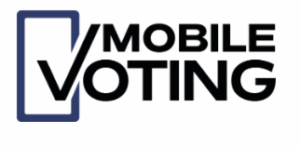 Mobile Voting: The Mobile Voting Foundation and Free & Fair announced the release of VoteSecure, an open-source software development kit (SDK) designed to make secure, transparent, and end-to-end verifiable mobile voting possible. VoteSecure is the first open-source SDK for end-to-end encrypted and end-to-end verifiable mobile voting systems. The open-source SDK is now freely available on GitHub, allowing election technology vendors to audit, build upon, or integrate verifiable mobile voting into their platforms. Once implemented, the SDK allows for voters to receive a tracking code to follow the progress of their ballot. As an end-to-end verifiable system, voters can verify that their ballot was cast and count correctly throughout the process. It also ensures that the public can independently verify that the system is functioning correctly. VoteSecure also supports the use of identity verification tools like multi-factor authentication and biometric screening. Finally, VoteSecure is set up for airgapping, meaning that votes will only be tabulated once taken offline from the internet and that they are printed out for counting alongside traditional mail-in ballots. Election vendors Sequent and Democracy Live will begin implementing VoteSecure into their existing election product offerings in 2026.
Mobile Voting: The Mobile Voting Foundation and Free & Fair announced the release of VoteSecure, an open-source software development kit (SDK) designed to make secure, transparent, and end-to-end verifiable mobile voting possible. VoteSecure is the first open-source SDK for end-to-end encrypted and end-to-end verifiable mobile voting systems. The open-source SDK is now freely available on GitHub, allowing election technology vendors to audit, build upon, or integrate verifiable mobile voting into their platforms. Once implemented, the SDK allows for voters to receive a tracking code to follow the progress of their ballot. As an end-to-end verifiable system, voters can verify that their ballot was cast and count correctly throughout the process. It also ensures that the public can independently verify that the system is functioning correctly. VoteSecure also supports the use of identity verification tools like multi-factor authentication and biometric screening. Finally, VoteSecure is set up for airgapping, meaning that votes will only be tabulated once taken offline from the internet and that they are printed out for counting alongside traditional mail-in ballots. Election vendors Sequent and Democracy Live will begin implementing VoteSecure into their existing election product offerings in 2026.
 Sticker News: New Hampshire Secretary of State David Scanlan and Deputy Secretary of State Erin Hennessey announced the winners of the 2025 “I Voted” Sticker Contest. The contest had over 2,800 submissions from fourth and fifth grade students across the Granite State. Normally, the biannual contest has four winners. This year, however, the state decided to add two additional winners due to the number of submissions sent in. In a press release, the secretary of state thanked the Department of Education, local town and city clerks, and other organizations for facilitating the contest. They also thanked all who submitted entries, as well as the teachers who encouraged students to do so. The submissions brought great joy to the secretary of state’s staff during a stressful time with issues impacting the state and country, officials said. Hennessey expressed
Sticker News: New Hampshire Secretary of State David Scanlan and Deputy Secretary of State Erin Hennessey announced the winners of the 2025 “I Voted” Sticker Contest. The contest had over 2,800 submissions from fourth and fifth grade students across the Granite State. Normally, the biannual contest has four winners. This year, however, the state decided to add two additional winners due to the number of submissions sent in. In a press release, the secretary of state thanked the Department of Education, local town and city clerks, and other organizations for facilitating the contest. They also thanked all who submitted entries, as well as the teachers who encouraged students to do so. The submissions brought great joy to the secretary of state’s staff during a stressful time with issues impacting the state and country, officials said. Hennessey expressed 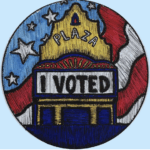 enthusiasm for the mass submissions for the contest, saying that contests like this bring out the best of New Hampshire. “The beautiful ‘I Voted’ sticker designs created by talented fourth and fifth grade students across New Hampshire encapsulate the best of the Granite State. We’re thrilled that interest in this biannual contest continues to grow and that our town and city clerks had such a fun time picking our winners,” she said. Civic and Voter Education Coordinator Lily Woo said over 100 schools participated in the contest and that the next generation of Granite Staters takes a lot of pride in the place New Hampshire holds in the democratic process. “The nearly 3,000 ‘I Voted’ stickers submitted from well over 100 schools and countless New Hampshire cities and towns are clear evidence that young Granite Staters take great pride in the treasured and time-honored features that make our state unique,” she said. Congratulations to Novalie Leone Fortenbery, a sophomore at Eastwood, and Sophia Salas, a fourth-grader at
enthusiasm for the mass submissions for the contest, saying that contests like this bring out the best of New Hampshire. “The beautiful ‘I Voted’ sticker designs created by talented fourth and fifth grade students across New Hampshire encapsulate the best of the Granite State. We’re thrilled that interest in this biannual contest continues to grow and that our town and city clerks had such a fun time picking our winners,” she said. Civic and Voter Education Coordinator Lily Woo said over 100 schools participated in the contest and that the next generation of Granite Staters takes a lot of pride in the place New Hampshire holds in the democratic process. “The nearly 3,000 ‘I Voted’ stickers submitted from well over 100 schools and countless New Hampshire cities and towns are clear evidence that young Granite Staters take great pride in the treasured and time-honored features that make our state unique,” she said. Congratulations to Novalie Leone Fortenbery, a sophomore at Eastwood, and Sophia Salas, a fourth-grader at 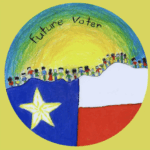 Coach Wally Hartley who are the 2026 winners of El Paso County, Texas’ annual “I Voted” sticker contest. In previous years, one winner was selected for the design. This year, the Elections Department chose winners in two categories – “Future Voter,” for students in elementary school, and “I Voted,” for high school students. “This year, we received 162 submissions compared to the 68 submissions for the last midterm election year. We are grateful for the students who take the time to share their beautiful art with us and the teachers who continue to encourage their students to participate” Lisa Wise, El Paso County elections administrator, said in a statement.
Coach Wally Hartley who are the 2026 winners of El Paso County, Texas’ annual “I Voted” sticker contest. In previous years, one winner was selected for the design. This year, the Elections Department chose winners in two categories – “Future Voter,” for students in elementary school, and “I Voted,” for high school students. “This year, we received 162 submissions compared to the 68 submissions for the last midterm election year. We are grateful for the students who take the time to share their beautiful art with us and the teachers who continue to encourage their students to participate” Lisa Wise, El Paso County elections administrator, said in a statement.
Personnel News: Terry County, Texas Joint Elections Director Krystal Valenti is resigning. Walla Walla County, Washington Auditor Karen Martin is set to retire after 36 years with the county. Hickman County, Tennessee Administrator of Elections Martie Davis has submitted a letter of intent to retire. Lisa Hayes is stepping down after nearly 20 years as the Guadalupe County, Texas elections administrator. Timothy Hoffman is the new Hackensack, New Jersey clerk. Tess Wigginton has been appointed director of the Licking County, Ohio board of elections. Fairfield County, Ohio board of elections Director Brett Riffle has been placed on paid administrative leave until December. Lee County, Florida Supervisor of Elections Tommy Doyle announced he will step down from his position on January 14, after nearly a decade in office.
New Research and Resources
 Threats to Democracy: As state legislatures across the country become more polarized, citizens are increasingly turning to direct democracy to protect fundamental rights and advance popular policies that elected officials refuse to address. But the success of recent initiatives has prompted strong backlash from some state legislatures opposed to those efforts, leading to several states passing new restrictions that make it harder for citizens to utilize this powerful tool. The Movement Advancement Project (MAP) recently released a new report, Ballots vs. Backlash: Trends, Threats, and the Future of Direct Democracy. The report examines how direct democracy works across the states and the ways in which state legislatures are trying to restrict these processes. Efforts to limit access to direct democracy raise serious concerns; by making it more difficult for citizens to exercise rights guaranteed in state constitutions, public trust is undermined, and our democratic institutions are weakened. While polling consistently shows broad public support for policies ranging from reproductive rights to fair wages, state legislatures often refuse to act. This situation is sometimes referred to as a “representation crisis” where elected officials are more responsive to partisan ideology and special interests than to the voters who put them in office. In response, citizens have turned to direct democracy to bypass their indifferent legislatures. Direct democracy is a broad term that refers to processes outlined in state constitutions where citizens can propose and vote directly on laws and policies themselves, rather than relying on elected representatives to make those decisions for them. “The growing disconnect between public opinion and legislative action has created increased demand for direct democracy,” said Brian Hinkle, Senior Voting Policy Researcher at MAP. “But the same forces driving this disconnect are working to restrict these tools.” Although recent successes have demonstrated the power of this approach, these victories have triggered a severe backlash, with conservative state legislatures launching an unprecedented attack against these democratic actions. The result is a dangerous erosion of one of the fundamental principles of democracy: the right of citizens to directly participate in their own governance.
Threats to Democracy: As state legislatures across the country become more polarized, citizens are increasingly turning to direct democracy to protect fundamental rights and advance popular policies that elected officials refuse to address. But the success of recent initiatives has prompted strong backlash from some state legislatures opposed to those efforts, leading to several states passing new restrictions that make it harder for citizens to utilize this powerful tool. The Movement Advancement Project (MAP) recently released a new report, Ballots vs. Backlash: Trends, Threats, and the Future of Direct Democracy. The report examines how direct democracy works across the states and the ways in which state legislatures are trying to restrict these processes. Efforts to limit access to direct democracy raise serious concerns; by making it more difficult for citizens to exercise rights guaranteed in state constitutions, public trust is undermined, and our democratic institutions are weakened. While polling consistently shows broad public support for policies ranging from reproductive rights to fair wages, state legislatures often refuse to act. This situation is sometimes referred to as a “representation crisis” where elected officials are more responsive to partisan ideology and special interests than to the voters who put them in office. In response, citizens have turned to direct democracy to bypass their indifferent legislatures. Direct democracy is a broad term that refers to processes outlined in state constitutions where citizens can propose and vote directly on laws and policies themselves, rather than relying on elected representatives to make those decisions for them. “The growing disconnect between public opinion and legislative action has created increased demand for direct democracy,” said Brian Hinkle, Senior Voting Policy Researcher at MAP. “But the same forces driving this disconnect are working to restrict these tools.” Although recent successes have demonstrated the power of this approach, these victories have triggered a severe backlash, with conservative state legislatures launching an unprecedented attack against these democratic actions. The result is a dangerous erosion of one of the fundamental principles of democracy: the right of citizens to directly participate in their own governance.
 Youth Vote: Early data from CIRCLE’s National Study of Learning, Voting, and Engagement (NSLVE) shows that more than three out of four college students (76%) were registered to vote in 2024 and more than half (53%) voted in the election. While these numbers reflect lower participation than in 2020—which was a record-breaking year for electoral engagement—they are largely higher than in 2012 and 2016, highlighting that students’ voter engagement remains on the upswing. NSLVE is the nation’s only objective study of college students’ electoral participation. It is also a free service to higher education institutions that allows students and campus leaders to evaluate and improve the civic learning and engagement of their students. The full NSLVE national report and institutions’ confidential campus reports will be released in early 2026.
Youth Vote: Early data from CIRCLE’s National Study of Learning, Voting, and Engagement (NSLVE) shows that more than three out of four college students (76%) were registered to vote in 2024 and more than half (53%) voted in the election. While these numbers reflect lower participation than in 2020—which was a record-breaking year for electoral engagement—they are largely higher than in 2012 and 2016, highlighting that students’ voter engagement remains on the upswing. NSLVE is the nation’s only objective study of college students’ electoral participation. It is also a free service to higher education institutions that allows students and campus leaders to evaluate and improve the civic learning and engagement of their students. The full NSLVE national report and institutions’ confidential campus reports will be released in early 2026.
Ballot Measures, Legislation & Rulemaking
 Juneau, Alaska: The Juneau Assembly has shelved plans for a local ranked-choice voting system, saying the timing is wrong as the city prepares for significant budget strain. Assembly member Ella Adkison moved to table the decision on the voting system indefinitely, after first introducing the ordinance in August. The Assembly is facing a budget shortfall resulting from tax cuts approved during October’s election. Adkison said that the city will face cuts to services and layoffs as a result. “It’s going to be a really tough time for Juneau and we’re going to spend a lot of time and energy as a community getting through that hard time and I don’t think this is the right time to implement this ordinance,” Adkison said. The motion to table passed unanimously with no further comment. Adkison emphasized that she still believes ranked choice voting would be good for Juneau.
Juneau, Alaska: The Juneau Assembly has shelved plans for a local ranked-choice voting system, saying the timing is wrong as the city prepares for significant budget strain. Assembly member Ella Adkison moved to table the decision on the voting system indefinitely, after first introducing the ordinance in August. The Assembly is facing a budget shortfall resulting from tax cuts approved during October’s election. Adkison said that the city will face cuts to services and layoffs as a result. “It’s going to be a really tough time for Juneau and we’re going to spend a lot of time and energy as a community getting through that hard time and I don’t think this is the right time to implement this ordinance,” Adkison said. The motion to table passed unanimously with no further comment. Adkison emphasized that she still believes ranked choice voting would be good for Juneau.
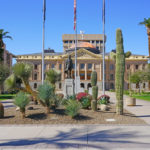 Arizona: State Republicans have introduced a measure to place the Arizona Secure Elections Act on a future ballot. On November 1, Rep. Alexander Kolodin filed House Concurrent Resolution 2001, according to a House Republicans announcement. He described the legislation as a comprehensive election-integrity measure that strengthens voter ID requirements, tightens security for mail-in voting and bans foreign money from influencing Arizona elections. If the Legislature approves it, the proposal would appear on a future general election ballot for voters to decide.“The Arizona Secure Elections Act gives voters clear rules, strong identification standards and the confidence that only citizens are taking part in our elections,” Kolodin said. He seeks to add several new rules to the elections process, such as: Banning foreign citizens or corporations from donating to candidates or ballot measures; Requiring that voters cast early ballots by 7 p.m. the Friday before Election Day; and Requiring voters who use mail-in ballots to confirm their preferred ballot-delivery address each election year.
Arizona: State Republicans have introduced a measure to place the Arizona Secure Elections Act on a future ballot. On November 1, Rep. Alexander Kolodin filed House Concurrent Resolution 2001, according to a House Republicans announcement. He described the legislation as a comprehensive election-integrity measure that strengthens voter ID requirements, tightens security for mail-in voting and bans foreign money from influencing Arizona elections. If the Legislature approves it, the proposal would appear on a future general election ballot for voters to decide.“The Arizona Secure Elections Act gives voters clear rules, strong identification standards and the confidence that only citizens are taking part in our elections,” Kolodin said. He seeks to add several new rules to the elections process, such as: Banning foreign citizens or corporations from donating to candidates or ballot measures; Requiring that voters cast early ballots by 7 p.m. the Friday before Election Day; and Requiring voters who use mail-in ballots to confirm their preferred ballot-delivery address each election year.
Republican state Sen. Shawnna Bolick filed SCR 1001, a ballot referral that would add new requirements for citizenship verification and voter ID if approved by lawmakers and voters in 2026. Specifically, SCR 1001 would require documented proof of citizenship before a ballot is issued, end early voting at 7 p.m. on the Friday before the general election, and require a government-issued ID for in-person and early-ballot voting. It’s the first bill introduced for Arizona’s 2026 legislative session, which convenes on Jan. 12.
 Dundee, Florida: The town of Dundee’s municipal elections will remain in April of next year, rather than being moved to November 2027. The town commission voted to keep the elections in April after community members raised concerns that moving them would also extend the terms of current council members by 18 months. During the commission meeting this week, Dundee town commissioners passed a motion, 4-1, to withdraw the ordinance. The majority of people who attended the public comment session were not in support of the ordinance. Town officials maintain that their tenure did not factor into the decision to draft the ordinance and that they were simply following direction from the Polk County Supervisor of Elections, who has asked cities within Polk County to move the elections to November to save money and increase voter turnout.
Dundee, Florida: The town of Dundee’s municipal elections will remain in April of next year, rather than being moved to November 2027. The town commission voted to keep the elections in April after community members raised concerns that moving them would also extend the terms of current council members by 18 months. During the commission meeting this week, Dundee town commissioners passed a motion, 4-1, to withdraw the ordinance. The majority of people who attended the public comment session were not in support of the ordinance. Town officials maintain that their tenure did not factor into the decision to draft the ordinance and that they were simply following direction from the Polk County Supervisor of Elections, who has asked cities within Polk County to move the elections to November to save money and increase voter turnout.
 Michigan: The fight against election disinformation and changes to Michigan’s petition circulation process cleared the upper chamber of the state Legislature on November 13 according to the Michigan Advance. Senators moved the legislative package with bipartisan support. Among the bills were Senate Bill 529, Senate Bill 530 and Senate Bill 531, sponsored by Democratic state Sens. Jeremy Moss of Bloomfield Township and Jeff Irwin of Ann Arbor. The Irwin-Moss bills would ban petition organizers from paying circulators per signature, joining other states that have banned financial incentives for circulators to lie to voters for support; require circulators to direct potential signers to a factual summary of the ballot proposal’s contents and purpose before collecting their signature; and ensure that only one signature is counted if two identical signatures appear on a single petition. The package also includes Senate Bill 533, which passed earlier this year and was sponsored by Democratic state Sen. Mary Cavanagh of Redford Township. Cavanagh’s bill would ban false statements or misrepresentations concerning elections, ensuring that bad actors would be fined and penalized.
Michigan: The fight against election disinformation and changes to Michigan’s petition circulation process cleared the upper chamber of the state Legislature on November 13 according to the Michigan Advance. Senators moved the legislative package with bipartisan support. Among the bills were Senate Bill 529, Senate Bill 530 and Senate Bill 531, sponsored by Democratic state Sens. Jeremy Moss of Bloomfield Township and Jeff Irwin of Ann Arbor. The Irwin-Moss bills would ban petition organizers from paying circulators per signature, joining other states that have banned financial incentives for circulators to lie to voters for support; require circulators to direct potential signers to a factual summary of the ballot proposal’s contents and purpose before collecting their signature; and ensure that only one signature is counted if two identical signatures appear on a single petition. The package also includes Senate Bill 533, which passed earlier this year and was sponsored by Democratic state Sen. Mary Cavanagh of Redford Township. Cavanagh’s bill would ban false statements or misrepresentations concerning elections, ensuring that bad actors would be fined and penalized.
 Nevada: The Legislature advanced a constitutional amendment this week to codify the practice of sending mail-in ballots to all registered voters, which has long been opposed by Republican Gov. Joe Lombardo. SJR1, introduced late Wednesday evening, would require a county clerk to send each active registered voter a mail ballot within a certain time frame and would allow individuals to choose not to receive a ballot. These provisions are already in Nevada law, but the amendment would enshrine them in the state Constitution, making it harder to overturn. The resolution did not receive a hearing, and its existence was publicly revealed for the first time shortly before lawmakers voted on it. As a resolution, instead of a traditional bill, the proposal does not need Lombardo’s approval and can pass with a majority vote in the Legislature. It will now head to the 2027 legislative session, where approval would send the measure to voters in 2028. The measure also includes provisions that would expand access to mail ballot drop boxes in the days leading up to Election Day. This was part of a proposal that the Legislature passed in the 2025 session, but Lombardo vetoed it, saying the measure “falls short of its stated goals while failing to guarantee appropriate oversight.” The drop box expansion measure was resurrected as part of a potential deal between Assembly Speaker Steve Yeager (D-Las Vegas) and Lombardo to require voter ID in state elections, but that deal fell apart after Lombardo said it would not do enough to require voter ID. The resolution passed the Assembly 25-8, along party lines, and passed out of the Senate on a 12-4 vote, with Republicans in opposition.
Nevada: The Legislature advanced a constitutional amendment this week to codify the practice of sending mail-in ballots to all registered voters, which has long been opposed by Republican Gov. Joe Lombardo. SJR1, introduced late Wednesday evening, would require a county clerk to send each active registered voter a mail ballot within a certain time frame and would allow individuals to choose not to receive a ballot. These provisions are already in Nevada law, but the amendment would enshrine them in the state Constitution, making it harder to overturn. The resolution did not receive a hearing, and its existence was publicly revealed for the first time shortly before lawmakers voted on it. As a resolution, instead of a traditional bill, the proposal does not need Lombardo’s approval and can pass with a majority vote in the Legislature. It will now head to the 2027 legislative session, where approval would send the measure to voters in 2028. The measure also includes provisions that would expand access to mail ballot drop boxes in the days leading up to Election Day. This was part of a proposal that the Legislature passed in the 2025 session, but Lombardo vetoed it, saying the measure “falls short of its stated goals while failing to guarantee appropriate oversight.” The drop box expansion measure was resurrected as part of a potential deal between Assembly Speaker Steve Yeager (D-Las Vegas) and Lombardo to require voter ID in state elections, but that deal fell apart after Lombardo said it would not do enough to require voter ID. The resolution passed the Assembly 25-8, along party lines, and passed out of the Senate on a 12-4 vote, with Republicans in opposition.
 New Jersey: Sen. Paul Sarlo (D-Bergen), who chairs the Senate Budget and Appropriations Committee, introduced S-4835 after a judge rejected more than 400 mail-in ballots cast in Bergen County largely for problems involving ballot envelopes. Sarlo’s bill would allow a voter to “cure” or fix a ballot in jeopardy of rejection if the voter failed to insert his ballot into the inner envelope, failed to sign or complete the certification on the inner envelope, failed to include or seal either the inner or outer envelope or if the envelope seal appears to have to been tampered with. The bill passed along party lines, with Democrats in support and Republicans in opposition. The only comment from Sarlo was his acknowledging that the association representing county clerks “has some issues” with the bill and his pledging to work with them before the bill would advance further. Under current law, a voter using a mail-in ballot has the opportunity to cure a ballot only for a mismatched signature. Voters have until the 11th day after Election Day – Nov. 15 this year – to submit a cure letter attesting that they did vote the ballot with the signature in question.
New Jersey: Sen. Paul Sarlo (D-Bergen), who chairs the Senate Budget and Appropriations Committee, introduced S-4835 after a judge rejected more than 400 mail-in ballots cast in Bergen County largely for problems involving ballot envelopes. Sarlo’s bill would allow a voter to “cure” or fix a ballot in jeopardy of rejection if the voter failed to insert his ballot into the inner envelope, failed to sign or complete the certification on the inner envelope, failed to include or seal either the inner or outer envelope or if the envelope seal appears to have to been tampered with. The bill passed along party lines, with Democrats in support and Republicans in opposition. The only comment from Sarlo was his acknowledging that the association representing county clerks “has some issues” with the bill and his pledging to work with them before the bill would advance further. Under current law, a voter using a mail-in ballot has the opportunity to cure a ballot only for a mismatched signature. Voters have until the 11th day after Election Day – Nov. 15 this year – to submit a cure letter attesting that they did vote the ballot with the signature in question.
 Ohio: Lawmakers voted to shorten the deadline again for returning absentee ballots — removing any grace period and invalidating all ballots that arrive after Election Day. That measure, Ohio Senate Bill 293, is now on its way to the governor. As recently as 2022, Ohio voters had a 10-day grace period for absentee ballots post-marked by Election Day to arrive at their local county board of elections to be officially counted. Ohio Republican lawmakers shortened that to four days for the 2024 election, and are now eliminating the grace period entirely. Threats from the Trump administration spurred Ohio lawmakers into action. In a March executive order, the president introduced a novel reading of federal law and simply declared all absentee ballots arriving after Election Day should be rejected. In recent months, the U.S. Department of Justice has been warning Ohio officials it might sue the state over the issue. At the last minute, the bill picked up an amendment that critics warn will increase provisional voting “exponentially” and make it far easier to cancel a voter’s registration. The changes direct county boards to promptly cancel a person’s registration if the secretary of state determines they aren’t a citizen. It’s a notable departure. Typically, county boards send a confirmation notice when they find a problem with a person’s registration. The amendment also directs the secretary to send reports to all 88 counties detailing apparent data mismatches. Voters identified in the report would receive a confirmation notice, and if they don’t provide corrected information they’d have to vote provisionally.
Ohio: Lawmakers voted to shorten the deadline again for returning absentee ballots — removing any grace period and invalidating all ballots that arrive after Election Day. That measure, Ohio Senate Bill 293, is now on its way to the governor. As recently as 2022, Ohio voters had a 10-day grace period for absentee ballots post-marked by Election Day to arrive at their local county board of elections to be officially counted. Ohio Republican lawmakers shortened that to four days for the 2024 election, and are now eliminating the grace period entirely. Threats from the Trump administration spurred Ohio lawmakers into action. In a March executive order, the president introduced a novel reading of federal law and simply declared all absentee ballots arriving after Election Day should be rejected. In recent months, the U.S. Department of Justice has been warning Ohio officials it might sue the state over the issue. At the last minute, the bill picked up an amendment that critics warn will increase provisional voting “exponentially” and make it far easier to cancel a voter’s registration. The changes direct county boards to promptly cancel a person’s registration if the secretary of state determines they aren’t a citizen. It’s a notable departure. Typically, county boards send a confirmation notice when they find a problem with a person’s registration. The amendment also directs the secretary to send reports to all 88 counties detailing apparent data mismatches. Voters identified in the report would receive a confirmation notice, and if they don’t provide corrected information they’d have to vote provisionally.
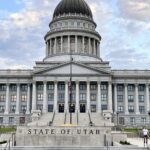 Utah: The Government Operations Interim Committee voted against approving a bill that would eventually phase out gathering signatures on paper in local elections. The text of the current bill requires the state to move to electronic signature gathering by 2030. It also requires state-approved devices, like a tablet or a phone, to scan driver’s licenses or other approved IDs of those who offer their signatures for a political candidate, ballot initiative, or referendum. Those devices would have to be able to operate while not connected to the internet or cellular data by 2028.During the hearing, Rep. Paul Cutler, R-Centerville, said the goal of the bill is to signal the state is shifting to a future of electronic signature gathering. “To make it faster, to make it more secure, and know that this person really is a valid member of the party and that it’s valid that they sign an initiative,” Cutler said. According to Ryan Cowley, Utah director of elections, state law already allows candidates to gather signatures on an approved electronic device if they want. But, according to his knowledge, no candidates have actually done this yet. The bill isn’t necessarily dead. Lawmakers said they would keep working on it, and the proposal could resurface in the 2026 general session, which begins in January.
Utah: The Government Operations Interim Committee voted against approving a bill that would eventually phase out gathering signatures on paper in local elections. The text of the current bill requires the state to move to electronic signature gathering by 2030. It also requires state-approved devices, like a tablet or a phone, to scan driver’s licenses or other approved IDs of those who offer their signatures for a political candidate, ballot initiative, or referendum. Those devices would have to be able to operate while not connected to the internet or cellular data by 2028.During the hearing, Rep. Paul Cutler, R-Centerville, said the goal of the bill is to signal the state is shifting to a future of electronic signature gathering. “To make it faster, to make it more secure, and know that this person really is a valid member of the party and that it’s valid that they sign an initiative,” Cutler said. According to Ryan Cowley, Utah director of elections, state law already allows candidates to gather signatures on an approved electronic device if they want. But, according to his knowledge, no candidates have actually done this yet. The bill isn’t necessarily dead. Lawmakers said they would keep working on it, and the proposal could resurface in the 2026 general session, which begins in January.
 Wisconsin: Assembly lawmakers approved a slate of GOP-authored election bills, including one that would change how absentee ballots are processed and eliminate the use of central count locations. But the measures approved do not include a plan to begin processing absentee ballots a day before the election, an idea that has long enjoyed bipartisan support. Republican backers of that plan — also known as Monday processing — have said there is not enough GOP support to get it across the finish line. Instead, the bill approved has many other provisions. It would ban the use of central count locations, where all absentee ballots from different wards are tallied at a single site. It would require any authorized absentee ballot drop box to be in a permanent building — as opposed to a mobile collection van or pop-up spot in a park. It would require clerks to return improperly filled ballots to voters, and elections officials to text voters that they’ve received their absentee ballot applications. Another bill would require the Wisconsin Elections Commission to investigate itself if it’s accused of violating the federal Help America Vote Act. Other election related legislation passed include: Expand the definition of “aggrieved” after voters file complaints against election officials and want to appeal; Require ballot questions, including proposed constitutional amendments, to be explained using language approved by both chambers of the Legislature, with that information to be posted at polling places, sent out with absentee ballots and published online; Establish new deadlines for the steps involved in certifying presidential election results; and Make it a crime for election workers to interfere with, or deny access for, election observers.
Wisconsin: Assembly lawmakers approved a slate of GOP-authored election bills, including one that would change how absentee ballots are processed and eliminate the use of central count locations. But the measures approved do not include a plan to begin processing absentee ballots a day before the election, an idea that has long enjoyed bipartisan support. Republican backers of that plan — also known as Monday processing — have said there is not enough GOP support to get it across the finish line. Instead, the bill approved has many other provisions. It would ban the use of central count locations, where all absentee ballots from different wards are tallied at a single site. It would require any authorized absentee ballot drop box to be in a permanent building — as opposed to a mobile collection van or pop-up spot in a park. It would require clerks to return improperly filled ballots to voters, and elections officials to text voters that they’ve received their absentee ballot applications. Another bill would require the Wisconsin Elections Commission to investigate itself if it’s accused of violating the federal Help America Vote Act. Other election related legislation passed include: Expand the definition of “aggrieved” after voters file complaints against election officials and want to appeal; Require ballot questions, including proposed constitutional amendments, to be explained using language approved by both chambers of the Legislature, with that information to be posted at polling places, sent out with absentee ballots and published online; Establish new deadlines for the steps involved in certifying presidential election results; and Make it a crime for election workers to interfere with, or deny access for, election observers.
Legal Updates
 Federal Litigation: Judge Sparkle Sooknanan, of the U.S. District Court for the District of Columbia this week declined to order the federal government to undo its overhaul of SAVE, a database that some states are using to check voters’ citizenship status, but said she doubted the legality of the government’s changes. SAVE, which is operated by the Department of Homeland Security, was typically used by states to check residents’ eligibility for public benefits. But the changes the Trump administration introduced in April made SAVE easier to use for screening voters’ citizenship, allowing state election officials to upload voter registration records for verification in bulk, instead of one by one, and search by Social Security number. The League of Women Voters and other plaintiffs in the case claimed that the changes made SAVE less accurate and were illegal, and asked the court for a temporary order that the database revert to how it operated before the overhaul. Sooknanan declined to issue the stay, saying the league failed to show that the changes caused irreparable injury. But she called for expedited proceedings to rule on the plaintiffs’ claim that the changes are illegal, given the “rapid ongoing developments and serious issues at stake.” Sooknanan ordered the parties to propose next steps by Nov. 21. She expressed urgency to resolve the case on the merits as quickly as possible.
Federal Litigation: Judge Sparkle Sooknanan, of the U.S. District Court for the District of Columbia this week declined to order the federal government to undo its overhaul of SAVE, a database that some states are using to check voters’ citizenship status, but said she doubted the legality of the government’s changes. SAVE, which is operated by the Department of Homeland Security, was typically used by states to check residents’ eligibility for public benefits. But the changes the Trump administration introduced in April made SAVE easier to use for screening voters’ citizenship, allowing state election officials to upload voter registration records for verification in bulk, instead of one by one, and search by Social Security number. The League of Women Voters and other plaintiffs in the case claimed that the changes made SAVE less accurate and were illegal, and asked the court for a temporary order that the database revert to how it operated before the overhaul. Sooknanan declined to issue the stay, saying the league failed to show that the changes caused irreparable injury. But she called for expedited proceedings to rule on the plaintiffs’ claim that the changes are illegal, given the “rapid ongoing developments and serious issues at stake.” Sooknanan ordered the parties to propose next steps by Nov. 21. She expressed urgency to resolve the case on the merits as quickly as possible.
The League of Women Voters of the United States, along with seven state and local chapters, filed a lawsuit challenging the U.S. Citizenship and Immigration Services’ (USCIS) August 2025 policy banning non-governmental organizations (NGOs) from providing voter registration assistance during naturalization ceremonies. According to the lawsuit, USCIS’s 2011 policy required that new citizens be given the chance and assistance to register to vote at naturalization ceremonies, allowing NGOs to help when local officials could not – but on Aug. 29, USCIS abruptly ended that system. Plaintiffs argue that USCIS’s voter assistance ban violates the Administrative Procedure Act because the agency issued a substantive, binding rule without undergoing the required notice-and-comment process, and because the policy is arbitrary and capricious, lacking any reasoned justification. Plaintiffs further assert that the policy infringes on their First Amendment rights to free expression and association. They are asking the court to block enforcement of the ban and prevent USCIS from withholding the schedule of upcoming naturalization ceremonies from the public.
 Alabama: U.S. District Judge Anna Manasco ordered the implementation of a remedial map for two Montgomery-area state Senate districts. Manasco, a Trump appointee, ordered the implementation of Remedial Plan 3, which Secretary of State Wes Allen, the defendant in the case, said was the “least bad of several bad options” in October to allow Black voters an opportunity to pick their preferred leaders in Senate Districts 25 and 26. The plaintiffs in the case said that the map was the “weakest remedy” to Manasco’s August ruling. “Ultimately, the record makes clear that Remedial Plan 3 unpacks District 26 by reassigning some Black voters to District 25 such that both districts are Black opportunity districts,” Manasco wrote. “The court thus finds that Remedial Plan 3 completely remedies the unlawful vote dilution the court found in the Enacted Plan.” Each party has 30 days to appeal Manasco’s order.
Alabama: U.S. District Judge Anna Manasco ordered the implementation of a remedial map for two Montgomery-area state Senate districts. Manasco, a Trump appointee, ordered the implementation of Remedial Plan 3, which Secretary of State Wes Allen, the defendant in the case, said was the “least bad of several bad options” in October to allow Black voters an opportunity to pick their preferred leaders in Senate Districts 25 and 26. The plaintiffs in the case said that the map was the “weakest remedy” to Manasco’s August ruling. “Ultimately, the record makes clear that Remedial Plan 3 unpacks District 26 by reassigning some Black voters to District 25 such that both districts are Black opportunity districts,” Manasco wrote. “The court thus finds that Remedial Plan 3 completely remedies the unlawful vote dilution the court found in the Enacted Plan.” Each party has 30 days to appeal Manasco’s order.
 Arizona: Former Republican state legislator Austin Smith pleaded guilty this week to charges that he personally forged more than 100 signatures on his petitions for reelection last year. “As a part of his guilty plea today, Smith admitted signing the name of a deceased woman on one of his candidate nomination petitions in March of 2024,” Arizona Attorney General Kris Mayes said in a statement. “He also admitted that he attempted to deceive the Secretary of State’s Office by knowingly filing petitions containing forged signatures of purported supporters of his nomination for the Republican primary for State Representative from LD 29.” Smith pleaded guilty to one count of attempted fraudulent schemes and practices, an undesignated offense, and to one count of illegal signing of an election petition, a misdemeanor. Smith was a member of the far-right Arizona Freedom Caucus, which has a history of spreading false claims of election fraud in the 2020 presidential election and pushed for election law changes in the state legislature.
Arizona: Former Republican state legislator Austin Smith pleaded guilty this week to charges that he personally forged more than 100 signatures on his petitions for reelection last year. “As a part of his guilty plea today, Smith admitted signing the name of a deceased woman on one of his candidate nomination petitions in March of 2024,” Arizona Attorney General Kris Mayes said in a statement. “He also admitted that he attempted to deceive the Secretary of State’s Office by knowingly filing petitions containing forged signatures of purported supporters of his nomination for the Republican primary for State Representative from LD 29.” Smith pleaded guilty to one count of attempted fraudulent schemes and practices, an undesignated offense, and to one count of illegal signing of an election petition, a misdemeanor. Smith was a member of the far-right Arizona Freedom Caucus, which has a history of spreading false claims of election fraud in the 2020 presidential election and pushed for election law changes in the state legislature.
 Arkansas: U.S. District Judge Timothy Brooks issued a preliminary injunction that blocks the enforcement of several direct democracy-related laws against Arkansas groups collecting signatures to qualify proposed ballot measures for the 2026 ballot. The League of Women Voters of Arkansas and ballot question committee Save AR Democracy filed the original lawsuit challenging the constitutionality of the laws against Secretary of State Cole Jester in the U.S. District Court for the Western District of Arkansas in April. Brooks allowed two other ballot question committees, Protect AR Rights and For AR Kids, to intervene in the case in July. Both sets of plaintiffs filed motions for a preliminary injunction, and the court held a hearing on the motions in late September. In his 77-page ruling, Brooks granted in part and denied in part the motions for a preliminary injunction. “Because the claim against him is moot,” Brooks also dismissed Attorney General Tim Griffin who intervened as a defendant in the case. Brooks preliminarily enjoined, pending a final disposition on the merits, the secretary of state, who is responsible for overseeing elections, and his officers from: Disclosing or facilitating disclosure to any member of the public any information provided by Plaintiffs or Intervenor-Plaintiffs pursuant to the Pre-Collection Disclosure Requirements of Arkansas Code § 7-9-601; Enforcing Act 602 against Protect AR Rights, including by finding its petition insufficient based on the reading level of the petition’s ballot title; Enforcing Act 241 and 453 against Plaintiffs, including by invalidating signatures, finding petitions insufficient, or pursuing criminal charges based on noncompliance; and Enforcing Acts 218, 240, and 274 against Plaintiffs or Intervenor-Plaintiffs, including by invalidating signatures, finding petitions insufficient, or pursuing criminal charges based on noncompliance. “In the General Assembly’s book, high rates of signature invalidation under the existing, highly regulated petition validation system are only evidence that the system has failed, not that the system has worked,” Brooks wrote. “These high rates of invalidation are used to justify more regulation, which will inevitably result in even higher rates of invalidation, justifying even more regulation and steadily chipping away at the right to direct democracy enshrined in the Arkansas Constitution.”
Arkansas: U.S. District Judge Timothy Brooks issued a preliminary injunction that blocks the enforcement of several direct democracy-related laws against Arkansas groups collecting signatures to qualify proposed ballot measures for the 2026 ballot. The League of Women Voters of Arkansas and ballot question committee Save AR Democracy filed the original lawsuit challenging the constitutionality of the laws against Secretary of State Cole Jester in the U.S. District Court for the Western District of Arkansas in April. Brooks allowed two other ballot question committees, Protect AR Rights and For AR Kids, to intervene in the case in July. Both sets of plaintiffs filed motions for a preliminary injunction, and the court held a hearing on the motions in late September. In his 77-page ruling, Brooks granted in part and denied in part the motions for a preliminary injunction. “Because the claim against him is moot,” Brooks also dismissed Attorney General Tim Griffin who intervened as a defendant in the case. Brooks preliminarily enjoined, pending a final disposition on the merits, the secretary of state, who is responsible for overseeing elections, and his officers from: Disclosing or facilitating disclosure to any member of the public any information provided by Plaintiffs or Intervenor-Plaintiffs pursuant to the Pre-Collection Disclosure Requirements of Arkansas Code § 7-9-601; Enforcing Act 602 against Protect AR Rights, including by finding its petition insufficient based on the reading level of the petition’s ballot title; Enforcing Act 241 and 453 against Plaintiffs, including by invalidating signatures, finding petitions insufficient, or pursuing criminal charges based on noncompliance; and Enforcing Acts 218, 240, and 274 against Plaintiffs or Intervenor-Plaintiffs, including by invalidating signatures, finding petitions insufficient, or pursuing criminal charges based on noncompliance. “In the General Assembly’s book, high rates of signature invalidation under the existing, highly regulated petition validation system are only evidence that the system has failed, not that the system has worked,” Brooks wrote. “These high rates of invalidation are used to justify more regulation, which will inevitably result in even higher rates of invalidation, justifying even more regulation and steadily chipping away at the right to direct democracy enshrined in the Arkansas Constitution.”
 Colorado: Federal officials have formally requested that former county clerk Tina Peters be transferred to federal custody, the latest in a monthslong effort by the Administration to free the election conspiracy theorist from a state prison cell. Officials with the Federal Bureau of Prisons sent a letter about Peters to Colorado’s Department of Corrections on Wednesday, the state confirmed Friday. It’s unclear why the bureau is seeking to transfer Peters, who was given a nine-year sentence to jail and prison last year after being convicted of charges related to unauthorized access to voting equipment. A corrections spokeswoman declined to release the letter and directed The Denver Post to file a records request to obtain it. The request comes after President Donald Trump has repeatedly called for Peters, a prominent supporter of his false stolen election conspiracies from 2020, to be released. In March, the Justice Department announced that it would review the state’s prosecution of the former Mesa County clerk to check for “abuses of the criminal justice process.” Peters has also challenged her own detention and has asked a judge to release her while she appeals her convictions. Her attorneys wrote to the judge in a filing that her “health has declined” during her incarceration. Peters, who is housed at the La Vista Correctional Facility in Pueblo, was convicted on state charges, so Trump cannot pardon her.
Colorado: Federal officials have formally requested that former county clerk Tina Peters be transferred to federal custody, the latest in a monthslong effort by the Administration to free the election conspiracy theorist from a state prison cell. Officials with the Federal Bureau of Prisons sent a letter about Peters to Colorado’s Department of Corrections on Wednesday, the state confirmed Friday. It’s unclear why the bureau is seeking to transfer Peters, who was given a nine-year sentence to jail and prison last year after being convicted of charges related to unauthorized access to voting equipment. A corrections spokeswoman declined to release the letter and directed The Denver Post to file a records request to obtain it. The request comes after President Donald Trump has repeatedly called for Peters, a prominent supporter of his false stolen election conspiracies from 2020, to be released. In March, the Justice Department announced that it would review the state’s prosecution of the former Mesa County clerk to check for “abuses of the criminal justice process.” Peters has also challenged her own detention and has asked a judge to release her while she appeals her convictions. Her attorneys wrote to the judge in a filing that her “health has declined” during her incarceration. Peters, who is housed at the La Vista Correctional Facility in Pueblo, was convicted on state charges, so Trump cannot pardon her.
 Iowa: The 8th Circuit U.S. Court of Appeals in St. Louis has denied Kim Taylor’s appeal of her 2023 voter fraud conviction. She was found guilty on 52 counts related to election fraud. In her appeal, Taylor had argued that Judge Leonard Strand had erred while ruling during her trial. A three-judge panel ruled that trial evidence supported Strand’s rulings. A 12-page opinion written by Circuit Judge David Stras states, “Voter fraud is no myth. Kim Phuong Taylor does not think what she did counts, but the jury instructions were accurate and the evidence was sufficient, so we affirm.” Taylor was found guilty by a jury on Nov. 21, 2023, of three counts of fraudulent registration, 26 counts of false information in registering and voting, and 23 counts of fraudulent voting. Taylor requested an acquittal on Dec. 1, 2023, claiming there was insufficient evidence supporting her conviction. The state filed a response rebutting Taylor’s motion, arguing that the families that testified at trial were more than enough to prove Taylor’s guilt. The judge denied the request on Jan. 18, 2024. She was eventually sentenced on April 1, 2024, to four months in prison, four months of home confinement, and two years of supervised release. Her prison sentence at a low-security facility in Waseca, Minnesota, has been completed.
Iowa: The 8th Circuit U.S. Court of Appeals in St. Louis has denied Kim Taylor’s appeal of her 2023 voter fraud conviction. She was found guilty on 52 counts related to election fraud. In her appeal, Taylor had argued that Judge Leonard Strand had erred while ruling during her trial. A three-judge panel ruled that trial evidence supported Strand’s rulings. A 12-page opinion written by Circuit Judge David Stras states, “Voter fraud is no myth. Kim Phuong Taylor does not think what she did counts, but the jury instructions were accurate and the evidence was sufficient, so we affirm.” Taylor was found guilty by a jury on Nov. 21, 2023, of three counts of fraudulent registration, 26 counts of false information in registering and voting, and 23 counts of fraudulent voting. Taylor requested an acquittal on Dec. 1, 2023, claiming there was insufficient evidence supporting her conviction. The state filed a response rebutting Taylor’s motion, arguing that the families that testified at trial were more than enough to prove Taylor’s guilt. The judge denied the request on Jan. 18, 2024. She was eventually sentenced on April 1, 2024, to four months in prison, four months of home confinement, and two years of supervised release. Her prison sentence at a low-security facility in Waseca, Minnesota, has been completed.
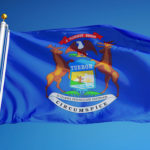 Michigan: Wayne County Judge Patricia Perez Fresard denied a request for a temporary restraining order that would have prevented the Wayne County Board of Canvassers from certifying a candidate who may contest losing the city’s Nov. 4 mayoral election by 11 votes. The request for the restraining order was made by the attorney for apparent Mayor-elect Adam Alharbi, who is suing his rival, City Council member Muhith Mahmood, claiming Mahmood lives outside of Hamtramck and is not eligible to run for city office. Mahmood is considering challenging his razor-thin loss based on questions about absentee ballots. The restraining order request asked Perez Fresard to prevent the Board of Canvassers from certifying the election, should the board declare Mahmood the winner. The board is set to meet Tuesday to certify the results of the Nov. 4 election races and issues across the county on the last possible day under state law. Following Fresard’s decision to deny the restraining order, attorneys for both sides vowed the battle over the disputed election will continue beyond an expected county decision Tuesday to certify the election.
Michigan: Wayne County Judge Patricia Perez Fresard denied a request for a temporary restraining order that would have prevented the Wayne County Board of Canvassers from certifying a candidate who may contest losing the city’s Nov. 4 mayoral election by 11 votes. The request for the restraining order was made by the attorney for apparent Mayor-elect Adam Alharbi, who is suing his rival, City Council member Muhith Mahmood, claiming Mahmood lives outside of Hamtramck and is not eligible to run for city office. Mahmood is considering challenging his razor-thin loss based on questions about absentee ballots. The restraining order request asked Perez Fresard to prevent the Board of Canvassers from certifying the election, should the board declare Mahmood the winner. The board is set to meet Tuesday to certify the results of the Nov. 4 election races and issues across the county on the last possible day under state law. Following Fresard’s decision to deny the restraining order, attorneys for both sides vowed the battle over the disputed election will continue beyond an expected county decision Tuesday to certify the election.
 Missouri: The Missouri Supreme Court must decide if voters need government-issued ID cards and whether people trying to register new voters can be paid. The judges on Wednesday heard a pair of cases arising from a 2022 law that also established two weeks of early voting before each election. If the high court throws out the voter ID portion of the law, it would trigger a provision that also scuttles the early voting period. The Missouri NAACP and the League of Women Voters filed both lawsuits and got a split result at the trial court level in Cole County. Circuit Judge Jon Beetem ruled the photo ID requirements were “everyday burdens” that did not violate voter rights but that the limitations on individuals and organizations running voter registration campaigns “chill speech and advocacy related to voting and decrease participation in elections.” Opponents of the voter ID requirements aren’t arguing that there should be no requirement for identification, Jason Orr of the ACLU of Missouri told the court Wednesday. It is the limited list of acceptable identification that violates voter rights, he said. To vote under the 2022 law, a person must present a Missouri drivers license, non-driver identification or another identification card issued by Missouri or the federal government with a photo, birthdate and expiration date. The voter registration provisions bar paid voter registration solicitors, require anyone working to register voters to be a registered Missouri voter at least 18 years old and to file paperwork with the secretary of state’s office. The law also banned the practice of paying people to collect absentee ballots on behalf of homebound voters. Arguing to overturn Beetem’s ruling, Deputy Solicitor General Michael Patton said the lower court ruling accepted too broad a definition of soliciting. Organizations can engage in voter registration drives that direct people to sign up through official government websites, he said, but cannot have individuals fill out cards that are turned in by the group.
Missouri: The Missouri Supreme Court must decide if voters need government-issued ID cards and whether people trying to register new voters can be paid. The judges on Wednesday heard a pair of cases arising from a 2022 law that also established two weeks of early voting before each election. If the high court throws out the voter ID portion of the law, it would trigger a provision that also scuttles the early voting period. The Missouri NAACP and the League of Women Voters filed both lawsuits and got a split result at the trial court level in Cole County. Circuit Judge Jon Beetem ruled the photo ID requirements were “everyday burdens” that did not violate voter rights but that the limitations on individuals and organizations running voter registration campaigns “chill speech and advocacy related to voting and decrease participation in elections.” Opponents of the voter ID requirements aren’t arguing that there should be no requirement for identification, Jason Orr of the ACLU of Missouri told the court Wednesday. It is the limited list of acceptable identification that violates voter rights, he said. To vote under the 2022 law, a person must present a Missouri drivers license, non-driver identification or another identification card issued by Missouri or the federal government with a photo, birthdate and expiration date. The voter registration provisions bar paid voter registration solicitors, require anyone working to register voters to be a registered Missouri voter at least 18 years old and to file paperwork with the secretary of state’s office. The law also banned the practice of paying people to collect absentee ballots on behalf of homebound voters. Arguing to overturn Beetem’s ruling, Deputy Solicitor General Michael Patton said the lower court ruling accepted too broad a definition of soliciting. Organizations can engage in voter registration drives that direct people to sign up through official government websites, he said, but cannot have individuals fill out cards that are turned in by the group.
 Pennsylvania: Lackawanna County Judge of Elections Kathie Sico, 67, and her son, Michael Sico, 46 were charged with election fraud and tampering with ballots on Election Day. Sico wrote her name on ballots so she could gain votes for judge of elections at one of Scranton’s Jackson Heights precincts, according to arrest affidavits. County Detective Colleen Catanese charged both with fraud by election officers, interference with an election, forging and destroying ballots and tampering with a public record. Catanese found 35 of 141 valid ballots had Kathie Sico’s name written in the section for election a judge of elections and/or inspector of elections. Of five other ballots discarded because of “imperfections or issues with the voting,” two more had Sico’s name in the judges of election section, according to the affidavits. County deputy sheriffs who investigated said Michael Sico told them “they were writing (his mother’s) name on the ballots because people were calling them and telling them to write her in.” In an interview, Kathie Sico “admitted to signing her name to ballots prior to voters receiving the ballots,” according to the affidavits. She said she wrote on two ballots “because someone asked her to and then someone else came and took the ballot instead.”
Pennsylvania: Lackawanna County Judge of Elections Kathie Sico, 67, and her son, Michael Sico, 46 were charged with election fraud and tampering with ballots on Election Day. Sico wrote her name on ballots so she could gain votes for judge of elections at one of Scranton’s Jackson Heights precincts, according to arrest affidavits. County Detective Colleen Catanese charged both with fraud by election officers, interference with an election, forging and destroying ballots and tampering with a public record. Catanese found 35 of 141 valid ballots had Kathie Sico’s name written in the section for election a judge of elections and/or inspector of elections. Of five other ballots discarded because of “imperfections or issues with the voting,” two more had Sico’s name in the judges of election section, according to the affidavits. County deputy sheriffs who investigated said Michael Sico told them “they were writing (his mother’s) name on the ballots because people were calling them and telling them to write her in.” In an interview, Kathie Sico “admitted to signing her name to ballots prior to voters receiving the ballots,” according to the affidavits. She said she wrote on two ballots “because someone asked her to and then someone else came and took the ballot instead.”
 Texas: Texas cannot use its new congressional map for the 2026 election and will instead need to stick with the lines passed in 2021, a three-judge panel ruled this week. “The public perception of this case is that it’s about politics,” U.S. Judge Jeffrey Brown, a Trump appointee, wrote in the ruling striking down the new lines. “To be sure, politics played a role in drawing the 2025 Map. But it was much more than just politics. Substantial evidence shows that Texas racially gerrymandered the 2025 Map.” Brown ordered that the 2026 congressional election “shall proceed under the map that the Texas Legislature enacted in 2021.” Attorney General Ken Paxton said in a statement that his office would ask the U.S. Supreme Court to reverse the ruling and allow the map to go into effect. But time is short: Candidates only have until Dec. 8 to file for the upcoming election. The map cleared the GOP-controlled Legislature in August and was quickly signed into law by Gov. Greg Abbott. Several advocacy groups sued over the new district lines, saying lawmakers intentionally diluted the voting power of Black and Hispanic Texans and drew racially gerrymandered maps. Over the course of a nine-day hearing in El Paso last month, they aimed to convince the judges that it was in voters’ best interest to shelve the new map until a full trial could be held. According to Votebeat, it was not immediately clear if the state still has a legal path to restoring the new map in time for 2026. Unlike most federal lawsuits, which are heard by a single district judge and then appealed to a circuit court, voting rights lawsuits are initially heard by two district judges and one circuit judge, and their ruling can only be appealed directly to the U.S. Supreme Court. The decision came from a three-judge panel made up of Brown; U.S. District Judge David Guaderrama, a Barack Obama appointee; and Judge Jerry Smith, who was appointed to the 5th U.S. Circuit Court of Appeals by Ronald Reagan. The ruling comes 10 days into the monthlong period when candidates can sign up for the March primary. The ruling has been appealed to the U.S. Supreme Court.
Texas: Texas cannot use its new congressional map for the 2026 election and will instead need to stick with the lines passed in 2021, a three-judge panel ruled this week. “The public perception of this case is that it’s about politics,” U.S. Judge Jeffrey Brown, a Trump appointee, wrote in the ruling striking down the new lines. “To be sure, politics played a role in drawing the 2025 Map. But it was much more than just politics. Substantial evidence shows that Texas racially gerrymandered the 2025 Map.” Brown ordered that the 2026 congressional election “shall proceed under the map that the Texas Legislature enacted in 2021.” Attorney General Ken Paxton said in a statement that his office would ask the U.S. Supreme Court to reverse the ruling and allow the map to go into effect. But time is short: Candidates only have until Dec. 8 to file for the upcoming election. The map cleared the GOP-controlled Legislature in August and was quickly signed into law by Gov. Greg Abbott. Several advocacy groups sued over the new district lines, saying lawmakers intentionally diluted the voting power of Black and Hispanic Texans and drew racially gerrymandered maps. Over the course of a nine-day hearing in El Paso last month, they aimed to convince the judges that it was in voters’ best interest to shelve the new map until a full trial could be held. According to Votebeat, it was not immediately clear if the state still has a legal path to restoring the new map in time for 2026. Unlike most federal lawsuits, which are heard by a single district judge and then appealed to a circuit court, voting rights lawsuits are initially heard by two district judges and one circuit judge, and their ruling can only be appealed directly to the U.S. Supreme Court. The decision came from a three-judge panel made up of Brown; U.S. District Judge David Guaderrama, a Barack Obama appointee; and Judge Jerry Smith, who was appointed to the 5th U.S. Circuit Court of Appeals by Ronald Reagan. The ruling comes 10 days into the monthlong period when candidates can sign up for the March primary. The ruling has been appealed to the U.S. Supreme Court.
 Wyoming: Weston County Clerk Becky Jo Hadlock, under fire for her actions during the November 2024 election pleaded not guilty November 14 to failing to appear at a legislative hearing where she had been subpoenaed to testify. Her attorney, Ryan Semerad, told the court his client wanted a trial. Hadlock faces a single misdemeanor charge accusing her of defying a legislative subpoena that required her to testify before a panel investigating her office in connection with errors that occurred during the November 2024 election. She faces up to six months in jail and a $100 fine if convicted. Circuit Judge Cynthia K. Sweet set a $500 personal recognizance bond for Hadlock, meaning the defendant won’t have to put up any money to remain free as long as she makes future court appearances. Hadlock sat beside Semerad for the five-minute hearing. She spoke only to enter her plea and answer procedural questions from Sweet.
Wyoming: Weston County Clerk Becky Jo Hadlock, under fire for her actions during the November 2024 election pleaded not guilty November 14 to failing to appear at a legislative hearing where she had been subpoenaed to testify. Her attorney, Ryan Semerad, told the court his client wanted a trial. Hadlock faces a single misdemeanor charge accusing her of defying a legislative subpoena that required her to testify before a panel investigating her office in connection with errors that occurred during the November 2024 election. She faces up to six months in jail and a $100 fine if convicted. Circuit Judge Cynthia K. Sweet set a $500 personal recognizance bond for Hadlock, meaning the defendant won’t have to put up any money to remain free as long as she makes future court appearances. Hadlock sat beside Semerad for the five-minute hearing. She spoke only to enter her plea and answer procedural questions from Sweet.
Opinions This Week
National Opinions: Election dates | Vote by mail | Early voting | Democracy | U.S. Supreme Court | 2020 Election | Youth vote
Alaska; Vote by mail | Ranked choice voting
California: Election protection
Georgia: Election security
Hawai’i: Vote by mail | Election commission
Michigan: Election rules
Minnesota: Ranked choice voting
North Carolina: Cumberland County
Ohio: Vote by mail
Pennsylvania: 2020 Election
Upcoming Events
Lessons Learned from 2025 Elections and the Path to 2026: Please join the Center for Election Innovation & Research for a webinar, “Lessons Learned from 2025 Elections and the Path to 2026.” In the webinar, CEIR Executive Director David Becker will discuss the 2025 elections, the federal government’s election-related actions, and the implications for the 2026 midterms. The discussion will cover President Trump’s March executive order on elections, the Justice Department’s lawsuits seeking access to states’ sensitive voter data, and voting trends in the off-year election cycle. David will analyze the current state of our election system and explore how voters can best prepare for the crucial midterm elections next year. When: November 24, 2:30pm Eastern. Where: Online
2025 Michigan Association of County Clerks (MACC) Fall Quarterly Meeting: When: December 1-2. Where: Traverse City.
2025 Alaska Association of Municipal Clerks Annual Meeting: When: December 7-10. Where: Anchorage.
Alabama Association of Municipal Clerks & Administrators Fall Conference: When: December 9-12. Where: Online & Tuscaloosa.
Launching RCV Maps 2025: The RCV Resource Center is proud to release the 2025 version of the RCV Maps Assessments. Join our policy team, Chris Hughes and Ryan Kirby, to learn about the updates in the 2025 version, national progress, and the next steps for RCV Maps! When: December 10, 3pm Eastern. Where: Online.
JEOLC 2026: The Election Center will host the 2026 JEOLC conference at the Ritz Carlton in Pentagon City, Virginia from January 6-10. One CERA renewal class will be offered. Please visit the Election Center website for more information and to register when it’s available.
iGO Midwinter Conference: The International Association of Government Officials will hold its Midwinter Conference in Albuquerque, New Mexico from January 19-23, 2026. Please visit the iGO website for more information and to register.
2026 NASS Winter Conference: The National Association of Secretaries of State will hold its 2026 Winter Conference in Washington, DC from January 28-31. Please refer to the NASS website for more information about the event and to register.
2026 NASED Winter Conference: Twice a year, National Association of State Election Directors members gather to discuss the latest developments in election administration. Members of the public are welcome to attend at the non-member registration rate. Please refer to the NASED website for information about the 2026 Winter Conference. When: Feb. 1-3, 2026. Where: Washington, DC.
2026 NACo Legislative Conference: The National Association of Counties will hold its 2026 Legislative Conference in Washington, DC from February 21-24, 2026. Please visit the NACo website for more information about the event and to register.
Election Center February Workshop: Focusing on interaction and sharing of practices selected by members to receive People’s Choice Awards, the February Workshops formalize those critical conversations that happen at conferences during meals, in the hallways, & the hotel lobby. The agenda augments the award-winning member presentations with applicable research and resources.Two CERA core courses and one renewal will be held following the workshop. When: February 25-27. Where: Jacksonville, Florida.
Job Postings This Week
electionlineWeekly publishes election administration job postings each week as a free service to our readers. To have your job listed in the newsletter, please send a copy of the job description, including a web link to mmoretti@electionline.org. Job postings must be received by 5pm on Wednesday in order to appear in the Thursday newsletter. Listings will run for three weeks or till the deadline listed in the posting.
Accounting & Payroll Specialist, King County, Washington– We are seeking a detail-oriented and collaborative professional to support payroll, finance, and human resources operations. The Accounting & Payroll Specialist supports the department’s mission by processing payroll and vendor payments, maintaining accurate financial and employee records, supporting audits and reporting, and contributing to continuous improvement initiatives. Work is performed under limited supervision and requires independent judgment. This position reports directly to the Administrative Services Manager and works closely with both the Finance Administrator I and the Human Resource Analyst. The ideal candidate thrives in a fast-paced environment, values accuracy and confidentiality, and enjoys delivering exceptional customer service to employees and partners throughout the organization. Salary: $30.50 – $38.80 Hourly. Deadline: December 1. Application: For the complete job listing and to apply, click here.
Certification Project Manager, VotingWorks– Your goal is to assist the Head of Compliance and Government Partnerships and the VotingWorks team in achieving Federal – and state – certification. Certification in the election space refers to testing voting systems – and sometimes other election technology – to a standard identified by the EAC (currently the Voluntary Voting System Guidelines 2.0) and/or additional requirements identified by a state. For federal certification, we work with a federally accredited Voting System Test Laboratory and the US Election Assistance Commission to gain certification. For states, there is some variability in certification programs, but those that require certification have a process and requirements set out that we would need to meet. The successful candidate will be extremely detail oriented, but also be able to see the forest from the trees, be a strong project manager, and also be able to build rapport with stakeholders, both internal and external. Salary: $104,000 – $150,000. Application: For the complete job listing and to apply, click here.
Director of Election Information Technology, King County, Washington– King County Elections (KCE) seeks a dynamic and visionary leader to serve as our Director of Elections Information Technology (Division Director – Technology). The Director of Elections Information Technology will report to the elected Director of Elections, serve as a member of the Department’s Leadership Team, and lead and support a highly skilled team to achieve excellence in election technology, security, and administration. This role will play a key part in developing departmental goals, strategies, and initiatives, driving the adoption of new technologies within KCE, and fostering a culture of innovation and collaboration. This is a unique opportunity to inspire and empower a team, drive the adoption of new technologies within KCE, identify opportunities to bring innovation to the forefront of our operations, and significantly impact the future of election administration in one of the most populous and diverse counties in the United States. This is a hybrid position that performs work remotely and on-site. As a leadership team member, this position is expected to work on-site frequently during active elections. Salary: $166,509 – $211,060. Application: For the complete job listing and to apply, click here.
Election Administrator, Victoria County, Texas–Performs vital work planning, organizing, coordinating, and managing federal, state, and local elections plus all facets of voter registration processes in accordance with the Texas Election Code, and other applicable federal, state, or local laws and regulations, including administrative direction from the Texas Secretary of State. Ensuring smooth elections operations including inputting and maintaining voter registration databases, training and supervising poll works, preparing staffing and logistics for voting, administering early voting by mail and in-person, supervising balloting & tabulation, and preparing final canvassing reports. Coordinating closely with political party chairs in conducting primary, runoff, and general elections while guaranteeing impartiality. Preserving voter registration applications, official election documents, and candidate campaign filings/disclosures. Salary: $61,494 – $76,868. Application: For the complete job listing and to apply, click here.
Elections Director, New Hanover County, North Carolina– New Hanover County, located on the North Carolina coast with a population of over 240,000 and approximately 183,400 registered voters, is seeking an Elections Director to become part of a dynamic, professional county organization with a clear vision as a vibrant, prosperous, diverse coastal community, committed to building a sustainable future for generations to come. The Elections Director will be responsible for planning and directing overall operations of the office of the New Hanover County Board of Elections in the preparation for and execution of all federal, state, and municipal elections in New Hanover County. The next Director will possess extensive knowledge of electoral procedures and policies as set forth in the NC General Statutes and will demonstrate critical thinking skills along with analytical and problem-solving abilities. Salary: $79,291 – $134,795. Application: For the complete job listing and to apply, click here.
Elections Director, Utah County, Utah– Under general direction of the County Clerk, plans, directs, and administers all federal, state, and local elections held within the county. Ensures strict compliance with all governing election laws and manages the elections functions including voter registration databases, electronic voting systems, candidate services, and the full elections process for Utah County. Salary: $97,136 – $111,716. Deadline: December 3. Application: For the complete job listing and to apply, click here.
Elections Manager, Kalamazoo County, Michigan–The purpose of this job is to manage and supervise all election operations within Kalamazoo County under the direction of the County Clerk and Chief Deputy Clerk. The Elections Manager ensures compliance with federal, state, and local election laws while coordinating with various jurisdictions to conduct fair, accurate, and transparent elections. This position is responsible for leading all phases of election planning, execution, and post-election auditing, supervising division staff, and serving as a liaison to election-related boards, commissions, local clerks, and the State of Michigan. Salary: $81,744- $95,638. Application: For the complete job listing and to apply, click here.
Deputy Director, Surrey County, North Carolina– The County of Surry is accepting applications for the full-time position of Deputy Director of Elections. This position assists the Elections Director with managing the daily operations of the Board of Elections office and with the preparation and conduct of elections in accordance with federal, state, and local laws. The Deputy Director also serves as Acting Director in the Director’s absence. Key responsibilities include planning, preparing, and conducting all elections; supporting candidate filing, ballot preparation, absentee and early voting, and election-day logistics; overseeing the testing, maintenance, and certification of voting equipment; assisting with reconciliation and post-election reporting; maintaining the voter registration database and conducting list maintenance; supervising and training precinct officials; coordinating polling places and election supplies; preparing training materials and forms; and ensuring compliance with election laws and security protocols. The position also requires excellent customer service to voters, candidates, political parties, and the public, along with representing the department at trainings and community events. Other duties may be assigned as needed. Salary: $41,508 – $69,124. Application For the complete job listing and to apply, click here.
Election Operations & Workforce Manager, Charleston County, South Carolina– The Board of Voter Registration and Elections is an award-winning organization dedicated to excellence in electoral processes. Our mission is to daily serve the Charleston County voting constituency with Vigilance, Objectivity, and Transparency in a manner that promotes due diligence Excellence in all aspects of Elections Management. We are committed to continuous improvement, innovative practices, and exceptional service to our community, ensuring every voter’s voice is heard. Are you driven by a passion for democracy and civic engagement? Join the Board of Voter Registration and Elections as the Election Operations and Workforce Manager and play a critical role in delivering seamless, fair, and accessible elections. Key Responsibilities: Poll Worker Recruitment and Management; Polling Location Management; Liaison and Community Engagement; Support for Election Operations on Election Day and Early Voting; and Team Leadership. Salary: $68,140 – $89,252. Application: For the complete job listing and to apply, click here.
Elections Analyst, City of Portland, Oregon– The City Auditor’s Office is seeking a mission-driven, versatile Elections Analyst to add capacity in critical areas of regulatory enforcement and ballot qualification. This position works within the Elections Division and will advance standards and procedures for the regulated community while providing timely information to the public. The Elections Analyst works within a team of five employees and reports to the City Elections Officer. The Elections Division serves Portlanders by providing elections cycle management, voter education campaigns, and oversight of campaign finance and lobbying regulations. We’re looking for someone that can provide fast-paced yet detailed program administration and analysis, plan for and conduct investigations, assist with communications, and provide general and technical customer service to a wide range of elections customers. The Elections Analyst works most closely on lobbying regulations and campaign finance enforcement while playing an important role in candidate and petition qualification. All staff have opportunities to learn and grow within the Division with cross-training and access to regular trainings and professional development throughout the year. Staff in the Elections Division are likely to have heavier workloads during and leading up to an election. The Auditor is an elected position, independent of City Council and accountable only to the public. The Auditor’s Office ensures open and accountable government by providing impartial reviews and investigations, access to public information, and services to City government and the public. It employs over 50 people across six divisions. Deadline: November 24. Application: For the complete job listing and to apply, click here.
Legislative Director, Finance, Pensions & Intergovernmental Affairs (FPIGA), NACo – We are seeking a highly motivated individual to serve as the Legislative Director for Finance, Pensions and Intergovernmental Affairs (FPIGA). This position also serves as NACo’s liaison to the Local Government Legal Center (LGLC). This position is responsible for developing and executing advocacy strategies, analyzing legislation and regulations, and engaging with federal officials and member counties on a portfolio including tax, finance, municipal bonds, public pensions, intergovernmental relations, and local governance legal issues. The Legislative Director will ensure counties have a strong voice in key federal fiscal and intergovernmental decisions and lead NACo’s engagement in legal advocacy through the LGLC. Salary: $100,000-$110,000. Application: For the complete job listing and to apply, click here.
Organizer, Minnesota– We are looking for a creative and collaborative Organizer to join the Common Cause team in Minnesota. This is a key role supporting our organizing and outreach programs and promoting civic engagement across the state. This is a full-time role reporting to the Executive Director, Minnesota and is based in Minnesota, with a preference for candidates located in Olmsted County or St. Cloud, with an expectation to travel around Minnesota at least 2 days per week, with a maximum of 5 days a calendar week during the legislative session, and peak summer engagement season. This is a termed position, starting on November 1, 2025 and ending October 31, 2027. Salary: $63,860 – $80,340 a year. Application: For the complete job listing and to apply, click here.
Remote Sales Director, SOE Software– SOE Software is seeking a driven Sales Director to expand our modernization and transparency solutions for state and local governments. In this full-cycle sales role, you’ll own the process from lead generation through contract signing. You’ll represent SOE at conferences and events, confidently starting conversations and building lasting relationships with government officials. By connecting our technology to outcomes like transparency, accessibility, and public trust, you’ll help election offices and public agencies better serve their communities. Application: For the complete job listing and to apply, click here.
Training Program Manager, Charleston County, South Carolina– Democracy works best when every election runs flawlessly—and that starts with exceptional training. As Training Manager for the Board of Voter Registration and Elections, you’ll empower our poll managers and staff to deliver elections that are fair, accessible, and trusted by every voter in Charleston County. The Board of Voter Registration and Elections is an award-winning organization dedicated to excellence in electoral processes. Our mission is to daily serve the Charleston County voting constituency with Vigilance, Objectivity, and Transparency in a manner that promotes due diligence Excellence in all aspects of Elections Management. We believe that people are the foundation of successful elections. That’s why training is not just a task—it’s a core function of our mission. When our teams are prepared, voters can be confident that their voice will be heard, and their ballot counted. As Training Manager, you are not simply teaching procedures—you are building trust in the democratic process. You will design and deliver training that helps every poll manager, staff member, and Board member understand the importance of their role, perform it with confidence, and meet the highest standards of service to our voters. Salary: $68,140.00 – $82,000.00 Annually. Application: For the complete job listing and to apply, click here.
Voter Outreach and Election Official Recruiting Coordinator, Buncombe County, North Carolina– Buncombe County NC is hiring an Elections Coordinator: Voter Outreach and Election Official Recruiting. Join our team headquartered in Asheville, NC surrounded by the Blue Ridge Mountains! This person will manage recruitment and voter outreach and also supports our Training Coordinator in planning and delivering trainings effectively. Ideal candidates work compassionately with technologically challenged community members, are able to build trust with all political parties, are highly organized, and are also comfortable with public speaking, phone calls and training adults of all ages. Elections experience is preferred. Salary: $29.51 – $34.96 per hour dependent on relevant experience. Deadline: November 30. Application: For the complete job listing and to apply, click here.
Marketplace
electionline provides no guarantees as to the quality of the items being sold and the accuracy of the information provided about the sale items in the Marketplace. Ads are provided directly by sellers and are not verified by electionline. If you have an ad for Marketplace, please email it to: mmoretti@electionline.org